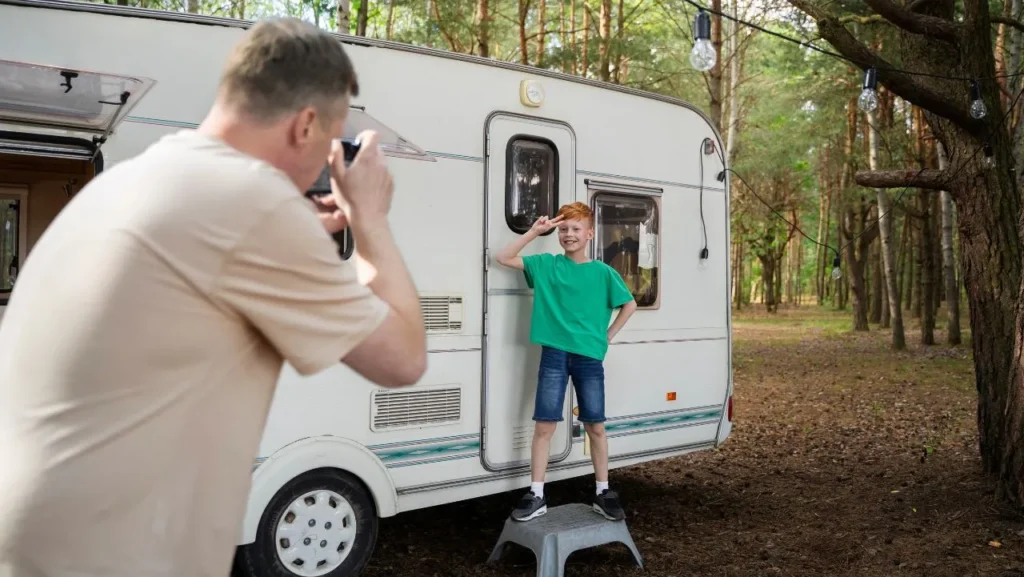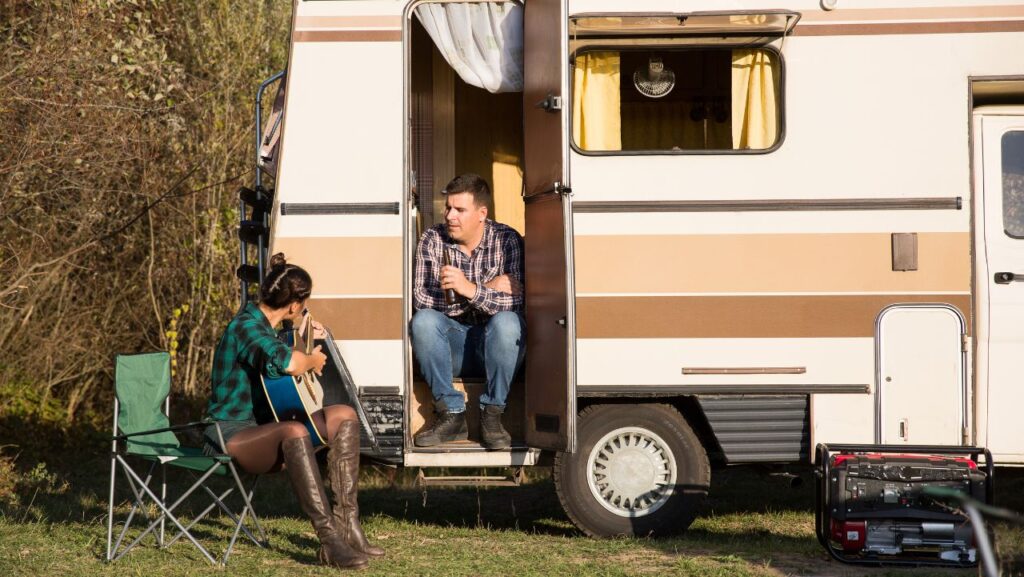
Dreaming of exploring United States from the comfort of your RV? The good news is, many states welcome full-time RV residents. This article will give you a quick rundown of states generally considered RV-friendly as of 2024, but always remember to check specific regulations for your chosen location.
So, buckle up and get ready for adventure – let’s find your perfect spot to park your mobile home!
What US States Allow You to Live in An RV Full-Time?
Living full-time in an RV offers a unique way to explore America with freedom and flexibility. Remember to check local regulations, but here’s a general overview of RV living across the US.
- Alabama: Living full-time in an RV is legal in Alabama. Remember to register your vehicle with the local county office.
- Alaska: Alaska allows limited RV camping (up to 14 days in one location). Full-time RV residency is not permitted.
- Arizona: There are no specific laws in Arizona prohibiting full-time RV living. However, some cities may have ordinances restricting it. It’s important to check local regulations before settling down.
- Arkansas: Living full-time in an RV is permitted in Arkansas as long as you’re on private property.
- California: California boasts some of the most relaxed laws for RV residency. You can stay in one location indefinitely as long as you avoid creating nuisances or health hazards. Public lands allow RV parking for up to 14 days without a permit.
- Colorado: Colorado allows full-time RV living, but adherence to local ordinances and any applicable laws is mandatory.
- Connecticut: Full-time RV living is allowed in Connecticut with some restrictions. Register your RV with the Department of Motor Vehicles and ensure you have a valid license plate.
- Delaware: Living in an RV full-time is strictly prohibited in Delaware. Residents cannot use their RV or shed as a dwelling. Violators face a $100 fine. Parking an RV on public property for more than 24 hours is also illegal without permission.
- Florida: Florida permits full-time RV living, but your RV must comply with county regulations and be connected to utilities.
- Georgia: There are no specific laws in Georgia prohibiting RV living, but some counties may have ordinances against it. Check local regulations before settling down.
- Hawaii: Sleeping in your RV is generally prohibited in Hawaii. While camping is allowed on some beaches, extensive research on local ordinances is crucial before attempting long-term RV stays. Parking restrictions for RVs may also be strict in certain areas. Thorough research is recommended before considering full-time RV living in Hawaii.
- Idaho: In Idaho, an RV can only be a permanent residence on private property if it has proper wastewater hookups and isn’t located inside an enclosed building. Occupancy is limited to six months and prohibited between November 30th and March 15th. Additionally, the occupant must be either:
- An Idaho resident with local employment
- A caregiver for the household
- A family member residing in the household
- Illinois: Living full-time in an RV is legal in Illinois, but always comply with local regulations.
- Indiana: Indiana has no specific laws regarding full-time RV living. However, some counties may have ordinances against it. Check local regulations before settling down.
- Iowa: Iowa allows full-time RV residency as long as you follow local ordinances and avoid creating nuisances or health hazards. Remember, RV living is only permitted on private property with the owner’s consent.
- Kansas: Full-time RV residency is allowed in Kansas but only on private property and with a valid registration from the Kansas Department of Motor Vehicles.
- Kentucky: Local governments in Kentucky have authority over land-use regulations. Before considering RV living, it’s crucial to check the specific ordinances in your chosen location. For instance, Lexington prohibits inhabiting campers on private property. Research local regulations thoroughly to avoid any issues.
- Louisiana: Living full-time in an RV is permitted in Louisiana. However, long-term stays require an inspection from local authorities.
- Maine: RV living regulations vary by municipality in Maine. Before attempting full-time RV residency, familiarize yourself with the local ordinances. Generally, it’s allowed as long as you don’t create nuisances or health hazards.
- Maryland: Maryland has specific regulations for RV living. The property must be one acre or larger, and RVs cannot be permanent residences. In permitted zones, the property owner, their tenants, or guests can utilize one RV on the property.
- Massachusetts: Massachusetts allows full-time RV residency in, provided you comply with local regulations and park on private land.
- Michigan: State law regarding mobile homes in Michigan prohibits using “travel trailers” and “camping trailers” as permanent residences. However, living in them on your property for short periods as emergency shelters may be allowed. Check local regulations for details.
- Minnesota: Minnesota allows full-time RV residency in certain state parks in, but compliance with local regulations and obtaining a park permit is mandatory.
- Mississippi: Living full-time in an RV is permitted in Mississippi with the property owner’s permission and adherence to local government restrictions.
- Missouri: Missouri law in requires RVs to be parked on owned or leased property and out of sight from public roads. Additionally, all RVs must be maintained in good condition to avoid code violations, including proper trash removal and waste management services if necessary.
- Montana: Living in your RV year-round on private property is allowed in Montana with no specific laws against it. However, local regulations may still apply, so be sure to research them beforehand.
- Nebraska: Nebraska requires a permit for any RV staying for 30 days or more. These permits are non-transferable, and a new owner must obtain a new permit when purchasing your RV.
- Nevada: Nevada law allows full-time RV living, but only outside city or town limits. The RV must also have a bathroom and shower and pass any required safety inspections.
- New Hampshire: While New Hampshire permits RV living statewide, there are restrictions. Many towns require parking RVs on designated land zoned for trailer parks or campsites. Others may allow living in your RV while actively working on building a permanent home. Check local regulations for details.
- New Jersey: Permits are required for living in an RV on private property in New Jersey. Additionally, all RVs must be well-maintained and not create health or safety hazards.
- New Mexico: New Mexico has stricter regulations for RV living on zoned land in. Most counties require connection to an onsite sewage system and a valid registration from the New Mexico Department of Motor Vehicles.
- New York: Similar to New Jersey, living in an RV on private property in New York requires permission from the local government.
- North Carolina: North Carolina allows full-time RV living as long as the vehicle is parked on your owned or leased property.
- North Dakota: Living in an RV is permitted in North Dakota, but compliance with local regulations is mandatory.
- Ohio: Full-time RV living is permitted in Ohio as long as your RV is parked on a lot that complies with local zoning regulations and you have obtained permission from the local government.
- Oklahoma: Oklahoma allows full-time RV residency, but adherence to local ordinances and a valid registration with the Oklahoma Department of Motor Vehicles are mandatory.
- Oregon: Oregon boasts some of the most relaxed laws for RV living in the country. You can park and live on public land as long as you avoid causing disruptions, damaging property, or violating other state laws. Additionally, a permit is not required for stays up to 14 days in one location.
- Pennsylvania: Pennsylvania has relaxed regulations for RV living. Residents can park and live in their RVs on private property with the owner’s consent, provided they comply with all local laws.
- Rhode Island: While Rhode Island allows RV living with minimal restrictions, it’s always recommended to check local ordinances to ensure compliance with all regulations.
- South Carolina: Living full-time in an RV is permitted in South Carolina as long as your vehicle is parked on private property with the owner’s consent.
- South Dakota: No specific laws or regulations prohibit full-time RV living in South Dakota.
- Tennessee: Tennessee allows RV living, but adherence to local zoning laws is mandatory. In some areas, a permanent foundation may be required. Areas without zoning tend to have less strict regulations.
- Texas: Texas allows full-time RV residency, but you must register your vehicle with the county and follow local ordinances.
- Utah: Full-time RV living is permitted in Utah as long as you comply with local ordinances and state laws regarding vehicle registration and other regulations.
- Vermont: Vermont allows RV residency on private land with the property owner’s permission.
- Virginia: Virginia can be an attractive option for RV and tiny home living, but be prepared for a potentially challenging permitting process that may involve septic system connections. Despite this, the state offers some of the most relaxed regulations for these alternative dwellings.
- Washington: Full-time RV residency is allowed in Washington, but some cities may restrict the duration of stay in a single location. Check local regulations before settling down.
- West Virginia: West Virginia permits full-time RV living, but requires county vehicle registration and compliance with local ordinances.
- Wisconsin: Wisconsin allows full-time RV residency as long as you follow local ordinances and avoid creating nuisances or health hazards.
- Wyoming: Wyoming has specific zoning regulations for RV living. You must be the landowner, and the property must be located in an approved zoning district (RAM, UA, RR-1, SR-1, UMR, C, or LI). Additionally, your RV must be self-contained or connected to a septic system.

Why the Restrictions? Zoning and Beyond
While many areas welcome full-time RV residents, there can be limitations in certain places. Here’s a breakdown of the main reasons:
- Zoning Laws: Zoning regulations dictate how land can be used in a specific area. Some zones may be restricted to residential homes or commercial buildings, and RV living might not be permitted.
- Safety Concerns: Local authorities may have concerns about safety hazards associated with full-time RV living, such as improper waste disposal or lack of proper sewage hookups.
- Maintaining Aesthetics: Some communities may have regulations to maintain a certain aesthetic standard, and RVs parked long-term might not be considered visually appealing.
Remember: Always check local ordinances before settling down in your RV. Now that you have a better understanding of state and local regulations, start planning your amazing RV adventure!
How Long Can You Stay?
While the dream of permanent RV living on your own land is tempting, regulations can vary. Here’s a breakdown to consider:
- Local Regulations Rule: In most states, living in an RV on your property is permissible as long as local zoning laws and regulations don’t prohibit it. Always check with your local municipality before settling down.
- Zoning Restrictions: Zoning regulations can limit land use in specific areas. Some zones might be restricted to permanent houses or commercial buildings, excluding RV living.
- Septic System Requirements: Some counties may require connection to a septic system if your RV becomes a permanent residence.
Remember: Researching local ordinances is crucial before making any decisions. Enjoy the freedom of RV living, but stay informed!
The RV Life: Freedom with a Few Considerations
Living full-time in an RV offers an adventurous lifestyle for many. A key takeaway is that most states allow it, but local regulations are crucial. Always check with your county or municipality regarding zoning restrictions, permitting requirements, and any other relevant ordinances.
While RV living presents freedom and flexibility, remember to consider potential drawbacks like limited space and weather challenges. With proper planning and research, full-time RV living can be a fulfilling experience for those seeking a unique and mobile lifestyle.

